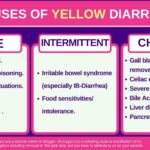Why does my poop come out in small soft pieces?
Our content is not intended nor recommended as a substitute for medical advice by your doctor. Use for informational purposes only.
KEY FACTS:
Causes of loose poop that come out in small soft pieces include dietary changes, food intolerances (such as lactose intolerance), infections of the gut, irritable bowel syndrome, and other causes of chronic or recurrent diarrhea such as celiac disease, IBD, or drugs.
Possible causes of soft poop coming out as small pieces:
- Dietary changes: consuming too many fats, fibers, or alcohol.
- Lactose intolerance (Difficulty digesting lactose sugar in milk and other dairy products).
- Other types of food intolerances such as fructose intolerance in fruits, FODMAP intolerance, etc.
- Stress or anxiety.
- Medications such as antibiotics, antacids, etc.
- Irritable bowel syndrome.
- Acute or chronic digestive infections such as giardiasis, etc.
- Others include inflammatory bowel disease, bile acid diarrhea, SIBO (small intestinal bacterial overgrowth), chronic pancreatitis, etc.
The causes of loose stool that comes out in small soft pieces are endless. Many digestive and non-digestive diseases may lead to such a condition.
The magnitude of your problem is often determined by the severity and the duration of the stool changes, other associated symptoms, and the presence of red flag signs such as weight loss, fever, or blood in the stool.
In this article, I’ll explain the most common causes likely to cause loose or soft poop that comes out in soft pieces.
1. Dietary changes.
Diet plays a very important role in how your stool looks. Dietary changes can lead to soft, segmented poop in a perfectly healthy person.
Your digestive system has a limit on the amounts of food or drinks it can handle; Diarrhea or loose stool may result from consuming excess foods or drinks beyond the capacity of your digestive system.
For example, eating a large fatty meal may lead to excess fat in your stool, reading to soft greasy stool that comes out in pieces.
Typically, your stool will revert to its normal form when you stop faulty food habits. And it may or may not be accompanied by mild symptoms such as cramps or gas that resolve rapidly.
Changes in your stool don’t necessarily mean you have intolerance or allergy to these foods. The reason for poop changes is consuming these foods or drinks in large amounts that can alter the poop form.
However, you should suspect food intolerance if diarrhea or stool changes occur after consuming small to moderate amounts of these foods.
Common foods associated with poop that comes out in small soft pieces include:
- A large fatty meal.
- Consuming too much milk, ice cream, yogurt, or other dairy products.
- Eating too much fructose or sorbitol-containing fruits such as apples and bananas.
- Drinking too much alcohol.
- Coffee and caffeinated drinks.
- Sugar substitutes such as aspartame.
- Garlic and onion.
- Broccoli and cauliflower.
- Spicy food.
Learn more about foods that may cause loose stool or diarrhea that disintegrates in toilet water.
2. Lactose Intolerance.
Lactose is the chief sugar in milk and other dairy products such as yogurt, ice cream, cheese, etc.
About 74% (Three out of every four) of the world’s adult population has a degree of lactose intolerance (reference).
As we become adults, many of us lose the ability to digest lactose sugar due to a gradual decline in the enzyme in our digestive system (reference).
This phenomenon of losing the ability to digest lactose when we become adults is called lactose non-persistence or primary lactose deficiency, which affects up to 100% of certain populations.
As a result, you may experience loose stool (that comes out in small soft pieces) or diarrhea after consuming milk or dairy products (even in moderation).
Symptoms of lactose intolerance:
- Abdominal pain.
- Bloating.
- Distension and excessive passing of gas.
- Nausea.
- Diarrhea may or may not be present.
- The stool often becomes watery, bulky, offensive, and yellowish and may disintegrate in toilet water.
- In children, the stools are bulky, frothy, and watery. Vomiting is common among adolescents with lactose intolerance.
The main treatments are limiting the amount of lactose in your diet and using lactose-free dietary replacement and lactase enzyme supplements.
3. Other forms of food intolerance.
Lactose intolerance is the most common form of food intolerance. However, several other foods and food constituents can also cause intolerance symptoms. Prevalence studies estimate that about one in every five people (20%) have a food intolerance (reference.
Diarrhea from food intolerance is accompanied by mild gastrointestinal symptoms (such as colics, bloating, and nausea). In some mild cases, it can also present with just loose stool (soft pieces).
Common forms of food intolerances:
- Fructose intolerance: a sugar present in most types of fruits and honey.
- FODMAP intolerance.
- Amines intolerance.
- Caffeine intolerance.
- Alcohol intolerance.
- Salicylates intolerance.
Learn more about types of food intolerance.
Keeping a food journal to record the pattern of your explained diarrhea and its relation to food is important.
The diagnosis of food intolerance is challenging. The similarities in symptoms and the variability in the severity make it more difficult to define food intolerance.
Always consult your doctor if you are unsure about the cause of unexplained soft or loose stool that disintegrates into soft pieces when it comes out.
4. Medications.
Too many drugs can cause loose stool or diarrhea. Changes in stool consistency due to a new or chronic medication can make your stool soft and fragmented into pieces.
More than 700 drugs can induce loose stool or diarrhea as a side effect. Check your list of drugs if you are taking medications for chronic diseases such as Diabetes mellitus, hypertension, or any other chronic disease.
Also, remember any recent medications (even if taken for a short period) as they may also cause disintegrating stool.
Common medications:
- Metformin: It is a widely used anti-diabetes medication and is considered the first-line therapy for new cases. Metformin-induced diarrhea is a very frequent side effect of the drug. Check your anti-diabetes tables, as they can be the source of unexplained diarrhea.
- Antibiotics: Antibiotic-associated diarrhea is a frequent side effect of taking antibiotics. Antibiotics cause the death of beneficial microbes inside your gut, disturbing digestion and allowing other harmful organisms to grow. Common antibiotics to cause such conditions are Penicillin, cephalosporins, and clindamycin antibiotics.
- Gastritis and GERD medications: – Proton Pump Inhibitors such as Esomeprazole (Nexium), Pantoprazole (Protonix), and Omeprazole (Prilosec). – H2 blockers such as Famotidine and Ranitidine (Zantac).
- Cancer chemotherapy:
- Immunosuppressive medications: These medications treat immune-mediated diseases such as Systemic Lupus, Rheumatoid Arthritis, Immune Thrombocytopenic Purpura, and others. Examples include Mycophenolate and Methotrexate.
- Furosemide (Lasix): A famous diuretic medication is used in various diseases, especially in people with heart disease.
- Chronic laxative abuse:
****For the complete list, Learn more HERE and HERE.
5. Stress/anxiety.
Your digestive system is one of the most vulnerable systems to psychological stress. The motility of your stomach, intestine, and colon is largely controlled by the nervous system.
For instance, many functional gastrointestinal diseases (such as IBS) are directly linked to psychological conditions such as anxiety, depression, and chronic stress.
Periods of stress may increase the motility of your intestine and colon. For instance, Many of us get diarrhea or frequent bowel movements during periods of stress, such as exams.
This condition may become recurrent in people with chronic psychological stress leading to abnormal stools (As loose poop that dissolves or disintegrates and floats on the surface of the toilet water.
Other effects of stress on the gut:
- Chronic or recurrent heartburn.
- Indigestion (functional dyspepsia).
- Nausea or vomiting.
- Chronic or recurrent abdominal pain.
- Constipation or diarrhea.
Learn More about stress, anxiety, and its relation to the bowel and the gut-brain axis.
6. Celiac disease.
Celiac disease is a relatively common disease affecting about 1% of people worldwide (reference).
In celiac disease, your small intestine becomes allergic to gluten (a protein found in wheat, rye, and barely). When you eat gluten, your intestine becomes severely inflamed, leading to malabsorption and stool changes, including abnormal stools that disintegrate in toilet water.
Symptoms of celiac disease:
- Chronic diarrhea or loose stool (stool is often yellowish, bulky, offensive, floats on water, and easily dissolves in water like sand).
- Sometimes, constipation also occurs.
- Bloating and gas.
- Nausea, loss of appetite.
- Weight loss.
- Anemia (can be severe if left untreated).
- Abdominal pain.
- In rare cases, it can cause constipation.
Learn more about stool changes in celiac disease.
7. Others (less common):
- SIBO (Small Intestinal Bacterial overgrowth).
- Chronic digestive system infections include chronic giardiasis, clostridium difficile infection, etc.
- Bile acid diarrhea.
- Inflammatory bowel disease.
- Colorectal cancer.
- Mesenteric ischemia.
- Chronic pancreatitis.
- Thyroid gland disease (hyperthyroidism).
- Cystic fibrosis.
- Radiation colitis.
- Neuroendocrinal tumors such as carcinoid tumors.
- Rare intestinal diseases include Whipple disease, tropical sprue, and short bowel syndrome.
- Sarcoidosis.
- Addison’s disease.
When (and when NOT) to worry?
Occasional loose stool that may dissolve in the toilet watery or disintegrates rapidly like sand without other symptoms, such as abdominal pain, is often due to dietary or lifestyle changes.
The disintegrating stool is not a cause of concern as long as it is temporary and not associated with other worrisome features such as abdominal pain or blood in the stool.
However, you should also talk to your doctor if you persistently have abnormal stools for a long period.
See a doctor if you have:
- Persistently loose stool for several weeks or months.
- Severe diarrhea.
- Bloody stool.
- Significant abdominal pain.
- Fever.
- Intense nausea or vomiting.
- Unexplained weight loss.
- Evidence-based
- Written by a doctor.






